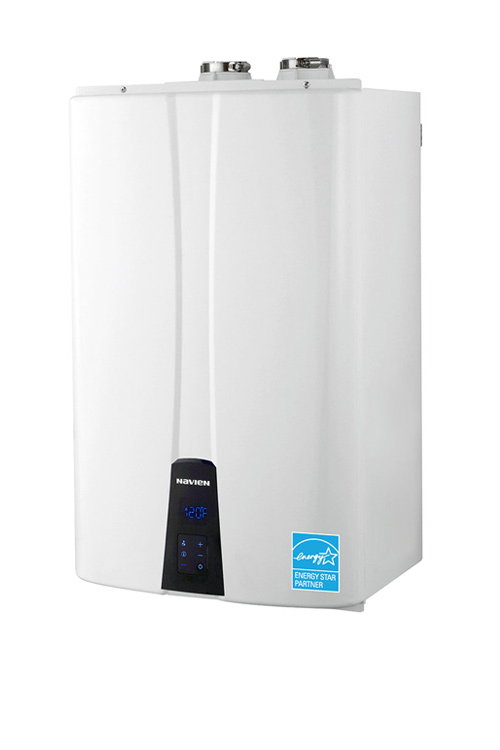A standard water heater will heat and store the water in a multi-gallon tank until the water is used up. If a home runs through the entirety of the hot water stored in the tank at one time, the home will have to wait until the tank water heater has refilled itself to use any more hot water.
Alternatively, a tankless water heater heats water on command. Instead of a large tank in your garage or tucked away in your home, a tankless water heater is compact and instantly heats water, but only when needed.
Tankless water heaters avoid the energy waste of constantly warming multiple gallons of water at one time and ensure that you will never run out of hot water.
What is a Tankless Water Heater
Tankless water heaters take up much less space than storage water heaters as they heat the water directly. When you turn on the hot water, the cold water travels through a pipe and into the tankless water heater unit where it is heated by a gas burner or an electric element. This allows you a constant supply of hot water.
On average, tankless water heaters can provide 2 to 5 gallons of hot water per minute. Gas-fired tankless water heaters, according to energy.gov, can produce higher flow rates than electric models.
For those with large families who go through a lot of hot water, installing more than one tankless water heater is common. This will ensure there is always enough hot water available for showers, laundry and the dishwasher.
Alternatively, a tankless water heater heats water on command. Instead of a large tank in your garage or tucked away in your home, a tankless water heater is compact and instantly heats water, but only when needed.
Tankless water heaters avoid the energy waste of constantly warming multiple gallons of water at one time and ensure that you will never run out of hot water.
Tankless Water Heater Advantages
Tankless water heaters (also called “on demand” units or an instant hot water heater) use 30 to 50 percent less energy than units with tanks, saving a typical family about $100 or more per year, depending on water usage.
These units heat water only when you turn on the faucet.
They usually operate on natural gas or propane.
The main advantage is that they eliminate the extra cost of keeping 40 to 50 gallons of water hot in a storage tank, so you waste less energy.
They also offer a continuous supply of hot water, which is ideal for filling a big hot tub or a whirlpool.
They’re more compact than a standard water heater and mount on a wall.
Alternatively, a tankless water heater heats water on command. Instead of a large tank in your garage or tucked away in your home, a tankless water heater is compact and instantly heats water, but only when needed.
Tankless water heaters avoid the energy waste of constantly warming multiple gallons of water at one time and ensure that you will never run out of hot water.
Tankless Water Heater Disadvantages
The primary disadvantage of on demand or instant hot water heaters is the upfront cost.
The smaller units that you often see won’t produce enough hot water to serve most households. They’ll only serve one faucet at a time—a problem if you want to shower while the dishwasher is running. There are larger units that can handle the demand of a whole family, but they are expensive.
But because tankless units have high-powered burners, they also have special venting requirements (a dedicated, sealed vent system, which requires professional installation). Natural gas burners often need a larger diameter gas pipe, which adds to the initial installation cost.
Alternatively, a tankless water heater heats water on command. Instead of a large tank in your garage or tucked away in your home, a tankless water heater is compact and instantly heats water, but only when needed.
Tankless water heaters avoid the energy waste of constantly warming multiple gallons of water at one time and ensure that you will never run out of hot water.
Gas Tankless Water Heaters
Gas tankless water heaters will last longer than traditional water heaters and they’re safer than conventional water heaters. One disadvantage is that if there is scale build up, a tankless water heater can automatically shut off.
Alternatively, a tankless water heater heats water on command. Instead of a large tank in your garage or tucked away in your home, a tankless water heater is compact and instantly heats water, but only when needed.
Tankless water heaters avoid the energy waste of constantly warming multiple gallons of water at one time and ensure that you will never run out of hot water.

Request a Quote:
We proudly service the following areas in the Lower Mainland: